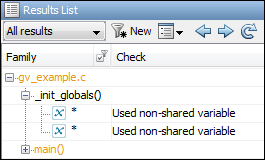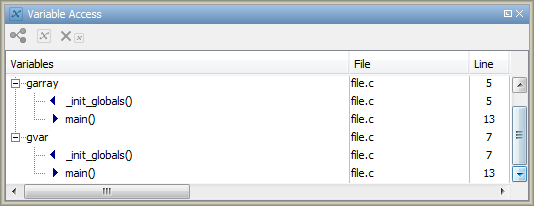Code Prover Assumptions About Global Variable Initialization
Global variables are variables that are visible throughout the program (unless shadowed by local variables). A Code Prover analysis makes specific assumptions about the initialization of global variables.
Global Variable Initialization When main Function Exists
If your code contains a main function, a Code Prover
verification considers that global variables are initialized according to
ANSI® C standards. The default values are:
0 for
int0 for
char0.0 for
float
and so on.
Sometimes, you might want to check if global variables are explicitly initialized in the code. For instance:
In a warm reboot, to save time, the bss segment of a program, which might hold variable values from a previous state, is not loaded. Instead, the program is supposed to explicitly initialize all non-const variables without default values before execution. You can delimit this initialization code and verify that all non-const global variables are indeed initialized in a warm reboot.
To delimit a section of code as initialization code, enter the pragma
polyspace_end_of_initin themainfunction. The initialization code begins from themainfunction and continues up to this pragma. Use these options to check the initialization code only and determine whether all global variables are initialized in this section of the code:The Code Prover analysis reports non-initialized variables using red or orange results in the initialization code for the checks:
To only check if global variables are explicitly initialized at the point of use, use the option
Ignore default initialization of global variables (-no-def-init-glob).The Code Prover analysis reports non-initialized variables using red or orange results for the check
Non-initialized variable.
Global Variable Initialization When main Function Does Not Exist
If your code does not have a main function, Code Prover begins
verifying each uncalled function with the assumption that
global variables have full range value, constrained only by their data type. See
also Code Prover Assumptions About Variable Ranges from Data Types.
For instance, consider this example:
int glob;
void func1_callee();
void func1() {
int loc = glob;
if(!glob)
func1_callee();
}
void func1_callee() {
int loc = glob;
}
void func2() {
int loc = glob;
}func1 and func2, the global variable
glob and consequently the local variable
loc has full range of int values.However, only uncalled functions begin with full-range values of global variables.
The function func1_callee is called in func1
after the value of glob is constrained to zero. In
func1_callee, the global variable glob and
consequently the local variable loc has the constrained value
zero.
How Code Prover Implements Assumption About Global Variable Initialization
The software uses the dummy function _init_globals() to
initialize global variables. The _init_globals() function is the
first function implicitly called in the main function (or
generated main function if there is no
main).
Consider the following code in the application
gv_example.c.
extern int func(int);
int garray[3] = {1, 2, 3};
int gvar = 12;
int main(void) {
int i, lvar = 0;
for (i = 0; i < 3; i++)
lvar += func(garray[i] + gvar);
return lvar;
}
After verification:
On the Results List pane, if you select File from the
 list, under the node
list, under the node
gv_example.c, you see_init_globals.
On the Variable Access pane,
gv_example._init_globalsrepresents the initialization of the global variable. The Values column shows the value of the global variable immediately after initialization.
What Initialization Means for Complex Data Types
The following table lists what is checked for each data type to determine initialization. The check happens at the time of read operations for the check Non-initialized variable and at the end of the initialization section for the check Global variable not assigned a value in initialization code.
| Data Type | What Green Check for Initialization Means |
|---|---|
Fundamental types (int,
double, etc.) | The variable is written at least once. |
| Array data types | Every array element is written at least once. |
| Structured data types | Every structure field that is used is written at least once. If you check initialization code only
using the option In the special case where none of the fields are used, the checks for initialization are orange instead of green if all the fields.are uninitialized. |
| Pointers | The pointer is written at least once. However, Code Prover does not check for initialization of the pointed buffer (till you dereference the pointer). |
| Enumerations | The enum variable is written at least
once. However, Code Prover does not check if the variable has
one of the enum values. |
See Also
Check that global variables are initialized after warm
reboot (-check-globals-init) | Verify initialization section of code only
(-init-only-mode) | Global variable not assigned a value in initialization
code | Non-initialized
variable